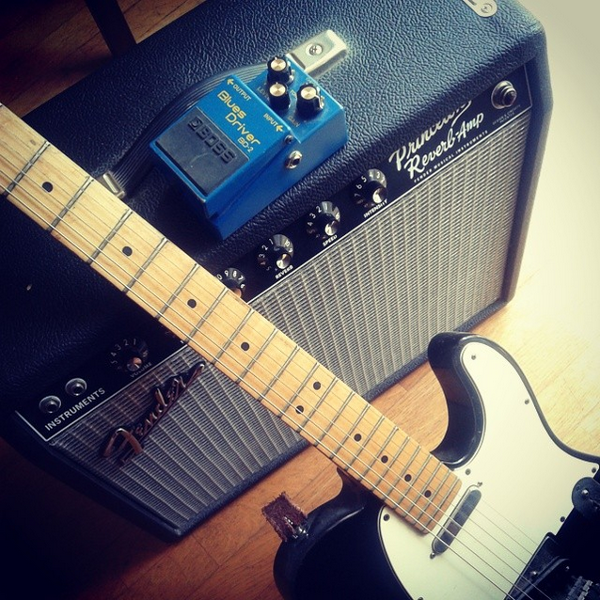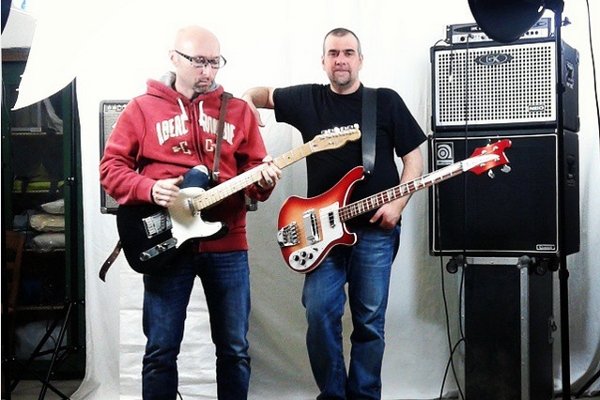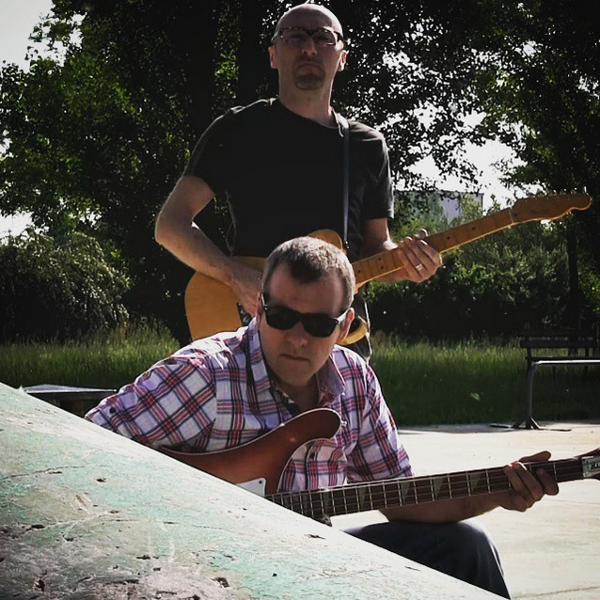LMP Asks #9: An interview with John Option
This month, in our first ever double interview, we talk to Max and Dadda of the Creative Commons band John Option. They are both FLOSS enthusiasts who enjoy making music on Linux and then sharing it with the world.

Max (left) and Dadda (right)
Hi Max and Dadda, thank you for taking the time to do this interview. Where do you live, and what do you do for a living?
Max: We both live in Italy and more exactly in the province of Reggio Emilia. I'm a network manager in a Department of the University of Modena and Reggio Emilia.
Dadda: I'm a software developer and I work in Modena.
Can you tell us a bit about the history of John Option and where did the name come from?
Max: We play together since almost 20 years, first with the band Radiostars then, when the Radiostars split one year ago, we continued with this project.
We are both users and advocates of free software and from there we started our new musical project. One night we had a beer together and talked about a possible name for our new band. We started discussing the origins of the name 'Ramones', the American punk rock band. The name Ramones came from Paul McCartney who used the alias "Paul Ramone" when he would check into hotels, incognito.
We started to think that it could make an interesting name for a band if we got the inspiration from one of the alias names used by the others members of the Beatles. Because the alias of McCartney was already taken we started thinking about the alias of Lennon, but none of us could remember it. I do not know exactly how, but in that moment came out the name John Option, which has nothing to do with the incognito name of Lennon (that was Long John) but we liked it and we kept it.

Dadda: Yes, with the Radiostars we recorded our music almost exclusively in traditional recording studios. In the last part of the experience with this band we started recording using our GNU/Linux PC.
As Massimo said we are users and supporters of free software so, when Radiostars split, we decided to start the John Option project with the intention of recording exclusively with free software and to release the songs and single recording tracks under the terms of the Creative Commons license Attribution Share alike.
What are your reasons for using a Creative Commons license and why do you feel it is important?
Max: We chose to publish our songs with a Creative Commons Attribution Share Alike license because we believe in free culture, and for the same reason we publish not only the songs but also the single recording tracks with the same license. This means that anyone can use one or more of our tracks to produce their own songs.
Dadda: I agree with Max, we believe in free culture and we like to share our songs. Creative Commons licenses allow this.
Can you tell us a bit about any other projects you are involved in?
Max: I'm one of the founders and activists of the Linux User Group of Scandiano (Reggio Emilia) and I am a fellow of the Free Software Foundation Europe, but first of all I am a free software user. Debian GNU/Linux is the only operating system on all my computers.
Dadda: I'm simply a GNU/Linux user. I installed my first distribution many years ago. It was, if i remember well, Redhat 5.2. Then i tried Mandriva, Fedora, Ubuntu and now Debian GNU/Linux.
What is your musical background?
Max: I started to play guitar when I was 17. My very first instrument was a classical guitar borrowed from my uncle. I never had a guitar teacher and in 1989 there was no internet in our houses, so I started with an handbook of guitar chords titled "Guitar player in 24 hours". Of course it took a bit more than a day to make a sound from the guitar that could even remotely be called "music" but at the end I got it.
Many friends of mine started to play an instrument in the same period, so we played together and we started to teach each other new songs and new guitar chords.
I love rock music from the origins of the delta blues of Robert Johnson to the more acidic contamination with electronic music by Moby, Kasabian, Prodigy and many others. However my favorite artists are from the sixties to the seventies: Beatles, Rolling Stones, Led Zeppelin and many others.
Dadda: One day, i remember, i asked my mother if she could buy me a guitar. I was 17, and like Max i also bought "Guitar player in 24 hours". Then, years later, i started playing the bass guitar with Max.
I like a lot of rock bands: Pink Floyd, Guns 'n' roses, Nirvana ("Grunge" in general). I also like '90s English pop: Blur, Oasis and Manic Street Preachers.
What is your typical workflow when making music?
Max: First of all we have to say that each of us records our tracks in our own homes and one of us collects all recorded material and assembles it for the final mix. We both have a Debian testing 64 bit machine and we use Ardour 3.5/JACK for recordings and Hydrogen 0.9 for drums.
We use plugins included in the Debian repositories: CALF and the Barry's Satan Maximizer are always included in our recordings... and of course many others great free software plugins. We share every single recordings track of our songs and complete Ardour and Hydrogen project files with a Creative Commons License so anyone interested in our set up can download it from our website johnoption.org.

When I write a new song I make a recording of it on my mobile phone then, when the song is more or less complete, I start to record single tracks. I look for the right BPM for the song then I start writing a simple drum beat with Hydrogen which will then be replaced with the final drum samples when the song comes to life. After the drums I record guitars and voice, then I send all the material to Dadda.
Dadda: My typical workflow is very similar. We share the tracks so, for example, Max can record some guitars for a song that i started, or I can record the bass for the song that Max wrote.
Tell us a bit about your hardware set up
Max: We both have HP Compaq DC 7800 that has an Intel Core2 Quad CPU Q6600 2.40GHz with 3Gb of RAM and a Focusrite Scarlett 2I2.
I use the following set of microphones: Shure SM57 for guitars and vocals and a Bluebird condenser microphone for vocals and acoustic guitars.

I also use a Golden Age Project Pre 73 DLX preamp.
All the guitars are recorded with a '91 Fender Telecaster and a Fender Princeton reverb amp.
I also use an Akai MPK mini keyboard for synth parts.

Dadda: Our computer is quite old but good enough to run Ardour, JACK and the other software we use.
For the voice or the classical guitar I use an Audio Technica AT2020 Condenser Microphone.
I record my Rickenbacker 4003 Bass in two ways: either I plug it directly into the USB recording interface, or mainly, i use the XLR out of my Gallien Krueger 400RB Head.

During the recording process, do you give each other feedback/direction or do you do it completely isolated?
Max: Yes, we share incomplete songs or audio notes and we meet often, usually with a couple of beers, to discuss about how to develop a song or what we like or do not like in a song still in the works. We also spend a lot of time, and drink a lot of beer, discussing ideas for our videos.
Dadda: We are not completely isolated, it's very important for any type of feedback to improve the songs.

Max and Dadda like a few beers for inspiration!
What is your history with Linux?
Max: I started using GNU/Linux in 1999. In the beginning I installed it to try something new but then, since 2000, it has become the only operating system on all of my PC's, at home and at work.
The first distribution that I used was Mandrake, then Mandriva, RedHat, Ubuntu and now, for some years I'm using Debian testing on all my machines.
Dadda: As i said before i installed my first distribution many years ago. I started using Linux at home, because I used it also at work and I was curious to try other operating system. I started with Redhat 5.2. Now I use Debian testing.
Why do you feel open source is important, and what for you is the most important aspect of Linux audio?
Max: I think it is important as a matter of freedom and that's why, without wishing to open an ideological discussion, I prefer to use the term "Free Software" rather than the term "Open Source" even because in the Italian language you do not have the possibility to misunderstand the term "free", that only stand for freedom.
I also use free software and free audio software because I love to take advantages to be a part of a community. A community of developers that produce great software and develop great new features, the possibility to open bug reports and to be helped by the community itself.
Dadda: In one word, what i like about open source is: sharing. Like a developer shares the code to the community, we share our songs to the people.

Max and Dadda on the video shoot for "Where is my car?"
What do you feel is currently lacking in Linux audio?
Dadda: I think nothing is currently lacking in Linux audio although maybe you have to pay attention to the hardware compatibility.
Max: I agree with Dadda: nothing is lacking in Linux audio... and if you feel that something is lack you can always open a report bug.
What is your favourite FLOSS plugin?
Max: I love all the CALF plugins and Barry's Satan Maximizer.
Dadda: I agree with Max: I like the CALF suite and the SWH plugins (especially the compressors).
Are there any FLOSS projects that you are excited about at the moment?
Dadda: I like very much the Guitarix project.
Max: It is the software that we use much the most.... I really like Ardour. It's a huge free software with great features and a really active development.
What changes, if any, would you like to see within the Linux Audio community?
Max: What I'd like to see is collaborative songwriting and recordings from people from the community, people with different culture and from different countries.
Dadda: I think no change is required. You can find all the answers to your questions in the community. I just hope an increase in users.
What advise would you give to a new Linux Audio user?
Max: Try Ardour4!
Dadda: Install Ardour, Hydrogen and JACK. Each distribution can do this easily. Begin to explore the infinite possibilities of the software. For questions and doubts there are dozens of how-to's and forums and not to stop at the first difficulty.
